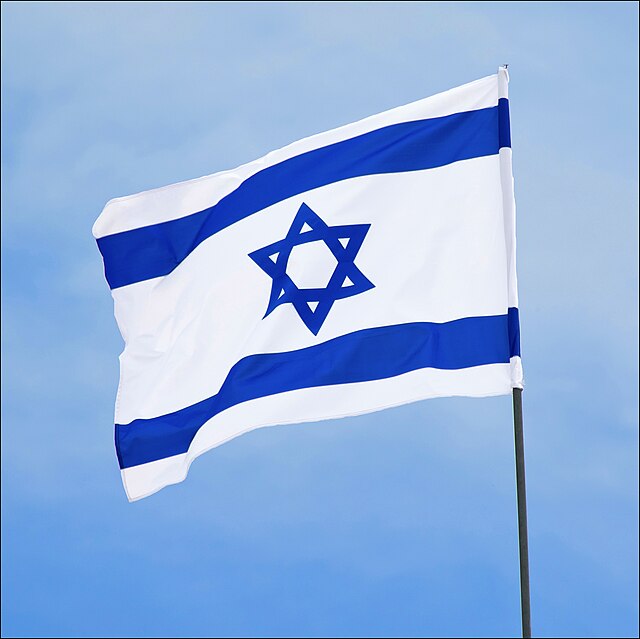Escalating Middle East Tensions and Biblical Prophecy
Israel has vowed to retaliate, heightening concerns of further violence in a region already fraught with tensions and uncertainty.

The flag of Israel in Yad LaShiryon, Latrun, Israel. (Wikimedia Creative Commons) דגל ישראל ב"יד לשריון", לטרון, ישראל
The ongoing turmoil in the Middle East took a dangerous turn on Wednesday when Iran launched a series of rocket attacks against Israel. The incident comes as tensions between Israel and its regional neighbors, particularly Iran and Hezbollah, continue to escalate.
Israel has vowed to retaliate, heightening concerns of further violence in a region already fraught with conflict and uncertainty.
Iran’s Rocket Attack and Israel’s Response
Iran’s rocket assault was reportedly in response to the killing of Iran-backed militant leaders, a development that Tehran has described as crossing a red line.
Israel, already engaged in military operations against Hezbollah forces in Lebanon and Hamas militants in Gaza, has vowed a powerful response to the attack.
“This assault will have consequences,” stated Rear Admiral Daniel Hagari, a spokesperson for the Israeli military. He emphasized that Israel would retaliate at the time and place of its choosing.
The recent event has deepened the sense of urgency among international leaders, who have called for restraint to prevent a broader regional conflict.
Global powers have urged de-escalation. But many observers, particularly those with a Christian worldview, are viewing these escalating tensions through a prophetic lens, pointing to possible links with Biblical prophecy.
Viewing the Conflict Through the Lens of Biblical Prophecy
For centuries, the Bible has been seen by some as containing prophetic visions concerning the fate of Israel and the surrounding nations.
These prophecies, found primarily in the books of Ezekiel, Isaiah, and Revelation, describe a time when Israel will be at the center of intense global conflict, culminating in a final battle.
One such prophecy is the war described in Ezekiel 38-39, often referred to as the “War of Gog and Magog,” where Israel is attacked by a coalition of nations from the north.
Some interpreters see Iran’s role in the current geopolitical landscape as significant, possibly alluding to the ancient name “Persia” in these texts. The increasing involvement of regional players like Iran, Hezbollah, and others in violent confrontations with Israel is seen by some as aligning with these prophetic descriptions.
Moreover, Isaiah 17 speaks of the destruction of Damascus, while Zechariah 12 prophesies that all nations will eventually gather against Jerusalem, signaling the final conflict before divine intervention.
Amid the escalating violence, these passages are revisited by those who believe that today’s events are part of the unfolding of these ancient predictions.
Religious Tensions and Global Repercussions
The conflict is not only political but deeply religious, with Jerusalem at the heart of it all. The city, considered sacred by Jews, Christians, and Muslims, has long been a flashpoint for clashes.
The current situation, with Israel facing military threats from multiple sides, echoes the scriptural imagery of a time when Jerusalem would be a “cup of trembling” to the nations (Zechariah 12:2).
Christian evangelicals, particularly those who hold to a dispensationalist view of the Bible, see the restoration of Israel in 1948 and the increasing isolation of the Jewish state as major steps toward the fulfillment of end-times prophecy.
The recent violence between Israel and its enemies is seen as a continuation of the struggles described in these ancient texts, with many believing that it heralds the approach of a final, apocalyptic confrontation.
Calls for Peace Amid Rising Tensions
Despite the apocalyptic overtones some ascribe to the current conflict, global leaders continue to call for peace.
The United Nations Secretary-General, António Guterres, has urged for a ceasefire, calling the escalating violence “unacceptable” and a threat to regional stability.
Pope Francis has also appealed for peace, designating October 7 as a day of prayer for an end to the conflict.
However, as Israel prepares its military for a potential large-scale retaliation and Iran and its allies position themselves for further aggression, the prospects for peace appear increasingly fragile.
The broader fear is that this could trigger a regional war, pulling in other players from the Middle East and beyond.
A Moment of Reflection
For those who read these events as part of Biblical prophecy, the escalating conflict serves as a reminder to prepare spiritually.
Whether one believes in the literal fulfillment of these prophecies or not, the violence and instability in the Middle East undeniably have far-reaching implications for world peace and security.
The world watches the conflict unfold and the escalation of tensions. And the ancient words of scripture continue to resonate with many, offering both a warning and a hope for divine intervention in times of great turmoil.
The question now is whether global diplomacy can pull these nations back from the brink of war, or whether the path forward will continue to echo the foreboding predictions of a final and catastrophic battle described in the Bible.








